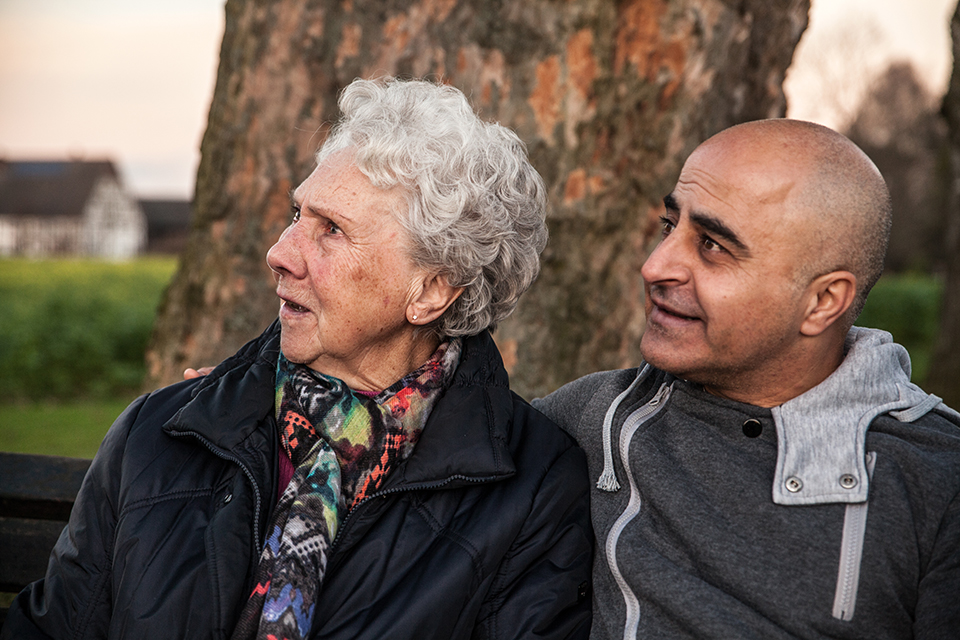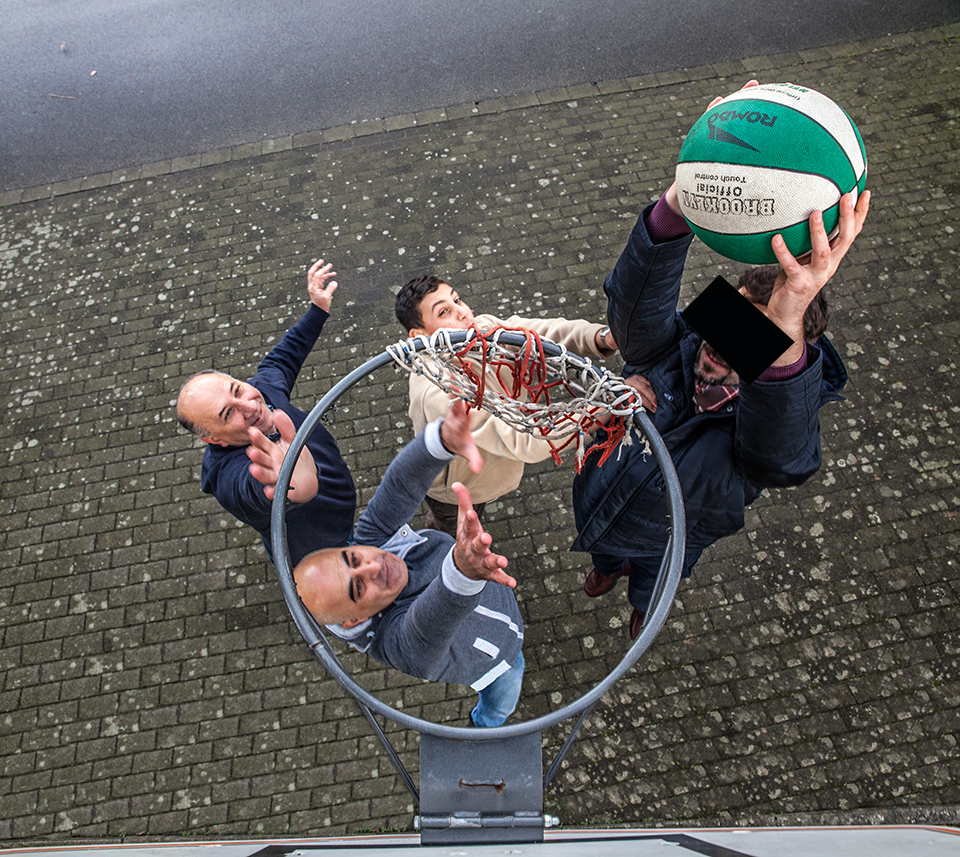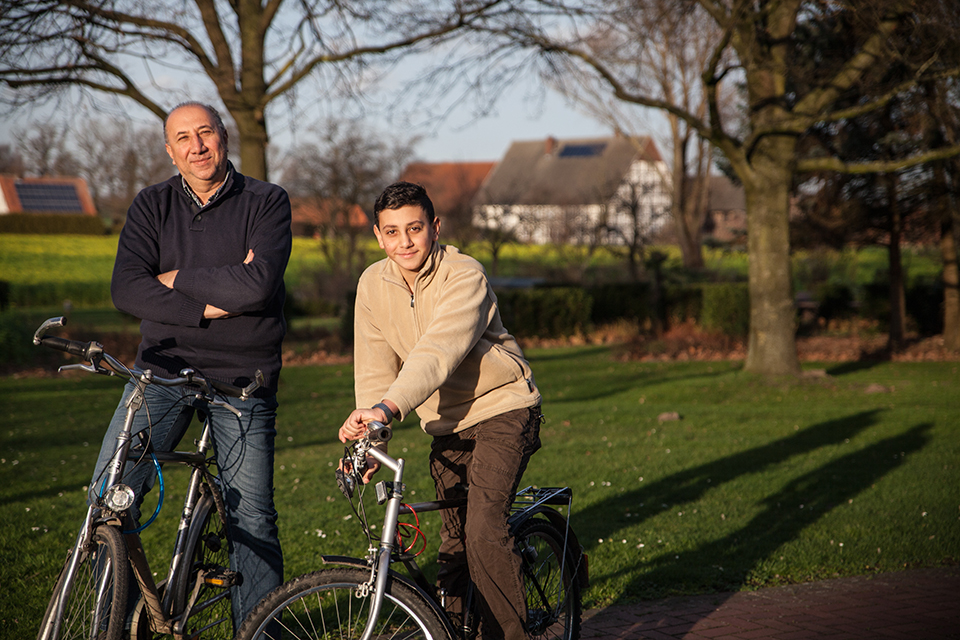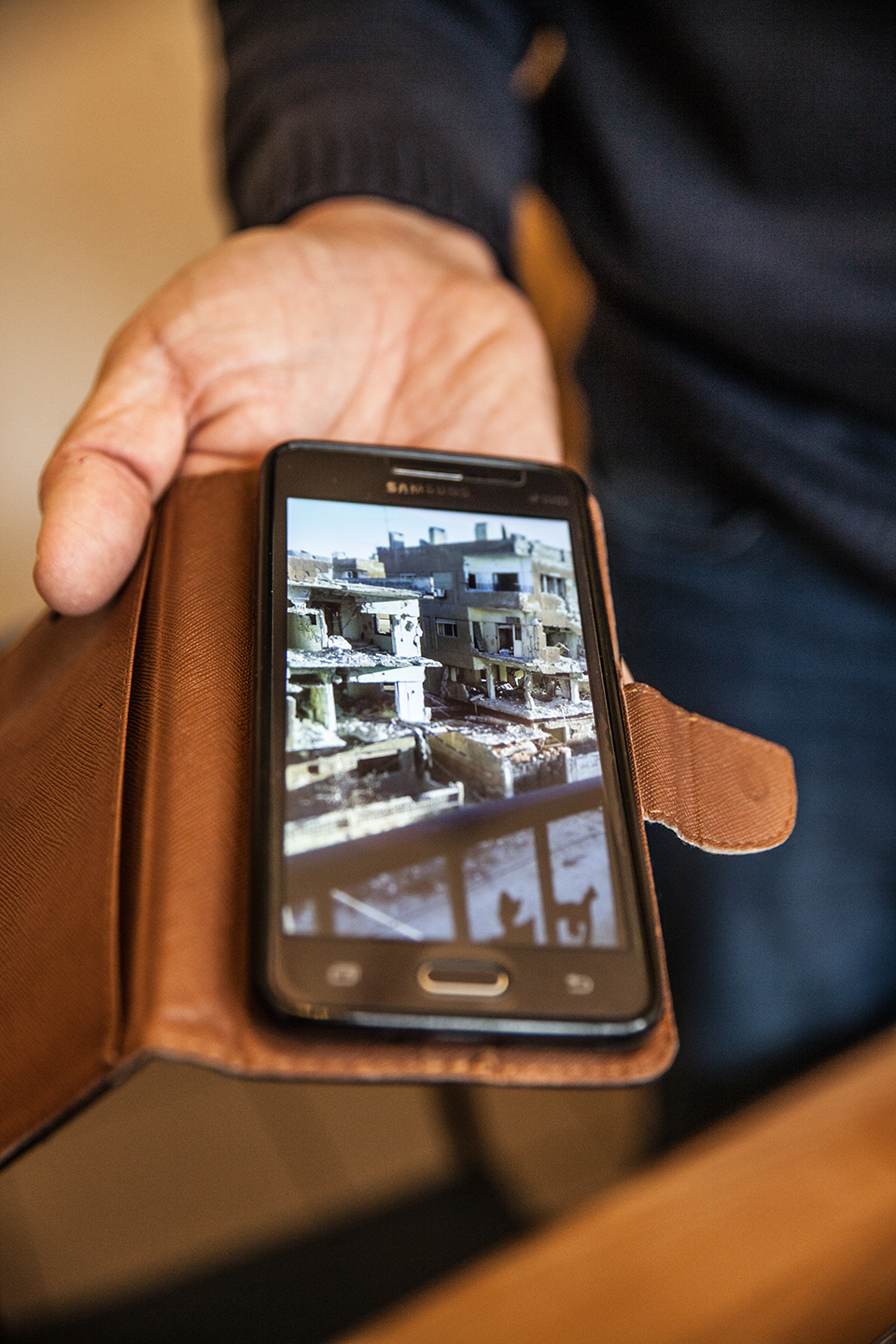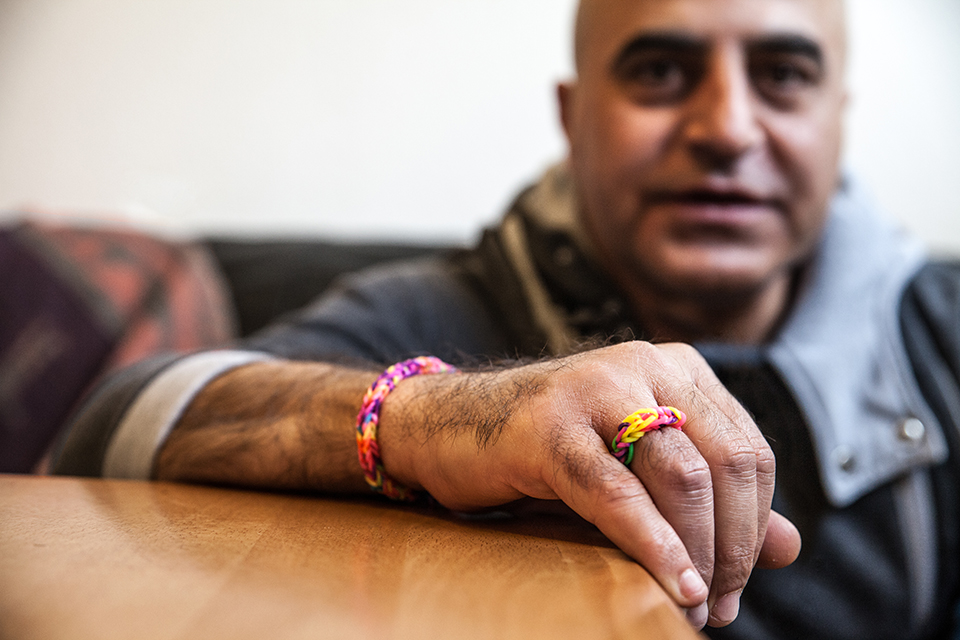M.*: (in German) I told the journalist that you are my friendly neighbor …
Oma Suermann: Yes, and you are my dear friends.
M.: … and that you always bring apple-.
Oma Suermann: Apple pie! Yes, which is delicious, right?
“The inhabitants always greet us, even if they don’t know us personally,” M. says, switching back to English. “They always try to help.” Oma Suermann, a 90-year-old great-grandmother living just across the street, not also brought them apple pie. When she heard that one of the young refugees has allergic reactions to his current bedding, she shows up with an old bedding from her adult grandson, printed with soccer logos. M. has his own theory as to why the oldest inhabitants are so friendly with them. “Maybe it’s because they themselves have suffered during the Second World War. Anyway, they seem to understand us, somehow.”
40 men and one boy from seven different countries cohabit in the former school of Liesborn-Göttingen. Just as flatmates in a typical German student apartment (“WG”) they cook for each other, decipher official letters for each other and refine their basketball techniques in the yard.
But especially the Syrians often discuss politics – too often, some say. But despite their heated debates – Was Assad’s regime the minor evil? Are there rebels who suppress Christians or not? – they can always agree on one vision in the end: They all want to live peacefully with one another, Muslims and Christians. “We have fled a war,” says Fadi. “Why should we incite a new one among us?”
—
Like many men Samer initially fled on his own in early 2015, assuming that he could let his family follow him as soon as he was in Europe. However, a year after his arrival his asylum application is still not consulted, let alone approved.
In the meantime in 2015, it was becoming increasingly dangerous for his son in Damascus. “I continued to go to school and play, but going outside was a huge risk,” said Gazi. “Many of my friends have been killed.” His father was especially worried about the militia groups around the capital that finance themselves with ransoms. “If the family of an abducted child does not pay, they kill it.”
Therefore, Gazi and his older sister decided to follow their father on their own. In the Aegean Sea, they had to watch as another refugee boat sank. They could not do anything; their boat was too crowded to take more refugees on board.
Gazi is the only child among the refugees based in Göttingen. He painfully misses his mother and his sisters, knowing that they are surrounded by rebels and government forces. “If I cannot find out about my request for asylum soon, I will let them take the same dangerous route as soon as it gets warmer,” says Samer. “That’s what we should have done long ago.”
A photo on his cell phone shows a landscape of rubble that must once have been a road. A multi-storey building is visible in the background, half torn apart by a bomb. Samer and Gazi point to a room on the third floor; we understand even without a word of Arabic. When the air-raid siren went off, they were able to safe their lives. However, their neighborhood and their memories are lost forever.
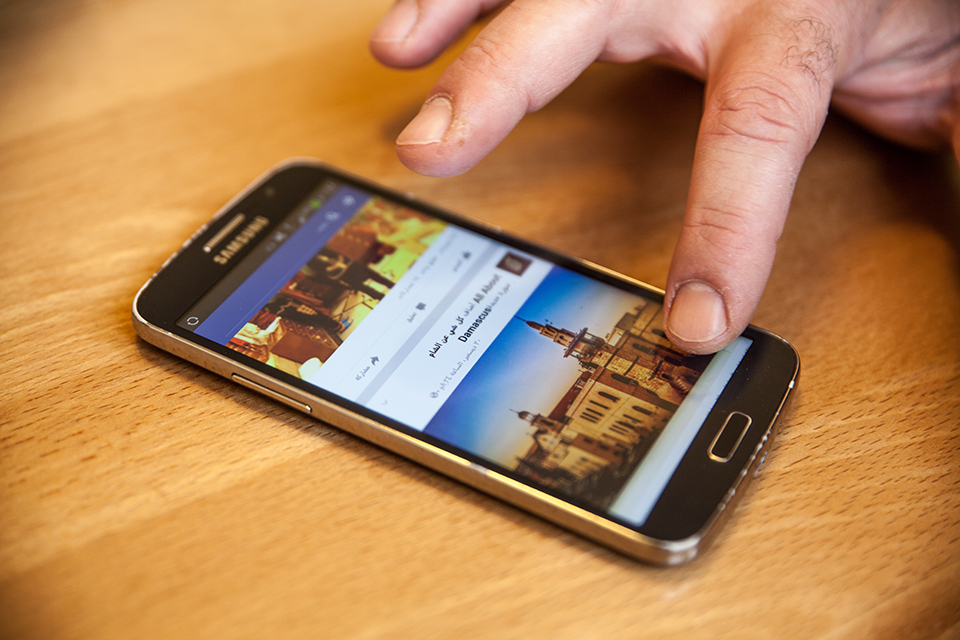 Samer has spent his whole life in Damascus, half a century. On his mobile phone he shows us a Facebook group that celebrates Damascus as it will probably never look again. With golden roof tops, baroque decorations and lively markets – one of the oldest cities in the world.
Samer has spent his whole life in Damascus, half a century. On his mobile phone he shows us a Facebook group that celebrates Damascus as it will probably never look again. With golden roof tops, baroque decorations and lively markets – one of the oldest cities in the world.
“It was a paradise”, he says. “When I stood on mountain Qāsiyūn and saw Damascus shining below me – with its old town, the city walls and the Grand Mosque – I was happy.”
Samer was an engineer in a textile company, his family was well-off. They had two flats and a shop, none of which is still standing. “Until a few years ago, I would never have imagined that a war could happen in our country,” he says. “When it started, I thought: This is the end, it will never be good again.”
In Hungary, Samer was detained for four days, not being allowed to eat or drink, because he refused to be fingerprinted. He knew that according to the Dublin III Agreement refugees are only allowed to apply for asylum in the country where they enter Europe, which is proven by fingerprints. But he had no intention to stay in Hungary with its right-wing government and its unbearable conditions for refugees; Samer was heading toward Germany.
It was Germany’s current Minister of Finance Wolfgang Schäuble who, during his time as Minister of the Interior, campaigned for the Dublin Agreement which kept refugees far away from the Federal Republic for years. Being allowed to apply for asylum only on Europe’s external borders, most of them ended in crowded camps in Italy and Greece.
After four days, hunger and thirst drove Samer to finally give his fingerprints to the Hungarian authorities. Nevertheless, he applied for asylum in Germany. And he might be successful as the Dublin Agreement has been temporarily suspended due to the refugee crisis of 2015.
—
Muhammad*, 21: “When my best childhood friend gave me this bracelet years ago, I put it aside. I just wasn’t the guy who would wear bangles. Until one day when we met for just another soccer match. After the game, we hung around on the field and talked as usually. Eventually, I said goodbye – probably I had to get something done. Fifteen minutes after I left, the sports field was hit by a shell. A shrapnel injured my friend so badly that he died. That same evening, I put on the bracelet and never took it off again.
For political reasons* it became more and more dangerous for my family if I stayed in Syria. I finally gave in to my Mom’s pleadings and left the country. As a refugee in Turkey I had a good life: The fact that I did not have papers was not an issue; nobody ever asked for them. In the very first week I found a job as a metal worker; for three and a half years I have been welding handrails and gratings with ornaments. I earned enough to send a part of my salary to my family in Syria.
But before the Turkish general elections in June 2015, I became restless. ‘Syrians out!’ was the very first campaign slogan of the opposition party. That is why I fled to Germany.
If only I had stayed in Turkey! The opposition lost the elections, so I could have quietly stayed and worked on. After alf a year in Germany however, I neither got my asylum approved nor did I receive a work permit. When I asked the German administration if I could return to Turkey, they told me that returning was impossible without a passport. I am shocked! The more I wait and just hang around without nothing to do, the more I will get used to this lazy life. This is what I want on no account.“
—
Together with Fadi, 45, he attends mass in the chapel of Göttingen every Sunday. As Christians, they are a minority in Syria. While the government and most rebel group do not distinguish between Christians and Muslims, Islamist groups are going particularly tough against Christians.
“The war has fueled mistrust between religious communities,” Fadi observes. When an Islamist group* approached his city, he decided to escape and get visas for his family once he is safe. Today he regrets not to have taken his three children and his wife immediately with him.
Fadi has his cell phone always at hand, it is his airlift home. His family keeps him updated on the situation in Syria via Facebook and WhatsApp. “A disaster is happening there,” he says. “My family has no water and no electricity, their district is being bombed every day now. At first we were only the buffer between the government and al-Nusra; now international airstrikes add to the chaos.” Recently an Israeli bomb stroke a building in the neighborhood, supposedly to kill a Hezbollah leader who was hiding there..
When he watches 14-year-old Gazi play in the courtyard, he can imagine his children on his side: his ambitious son, who wants to become an IT engineer, his artist son and his little daughter, who loves dancing ballet and learning languages. He can imagine them going to school here and waiting for the end of the war. Well, and one day the youngest would turn 18, the war would be over and he could return to Syria to rebuild all the houses which have been destroyed. Then he would finally see his summer house again, feed the animals and roam the wine plantations. And no one would disturb him.
* (Family) names and some details not mentioned due to security reasons
—
Any questions or comments? Here on twitter: @chessocampo
Would you like to read more? Welcome to subscribe to my occasional newsletter where I share current features, photo essays, portraits and interviews. If you are no longer interested, you can easily unsubscribe with one click. Or just follow me on Twitter or Facebook.
